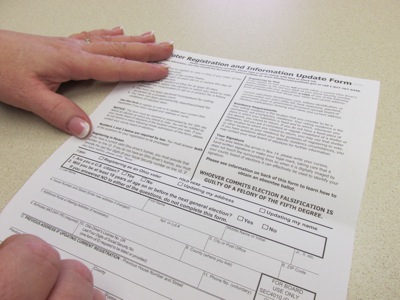Saturday, February 15th, 2014
Common Core data collection hailed by some, feared by others
By Amy Kronenberger
Collecting student data will be key to gauging Common Core's success.
But while supporters say gathering detailed data will provide a fuller picture of how students compare nationally and internationally, opponents fear it will endanger student privacy.
A thorough data collection system is the best way to track student success, Microsoft founder Bill Gates told the National Conference of State Legislatures in July 2009. Gates' foundation helped fund creation of Common Core, its test and textbooks.
"Common Core Standards define what the students need to learn. Robust data systems tell us whether they're learning, and they tell us a whole lot more than that," he said. "Most data on student performance today comes in the form of a snapshot. We know only how students did on a test at the end of the year - we don't see the progression. We don't have much context, and the information comes too late to improve the teaching."
The 2009 stimulus package known as the American Recovery and Reinvestment Act provided funding Gates said states should use to track student performance from early childhood through college and into the workplace. Gates encouraged states to embrace the data system as a way to track which practices help student and schools succeed. Those results could be used to improve teacher performance, he said.
"The solution is not to block teacher evaluations," he said. "The solution is to work with teachers who are eager to help build measurement systems that are transparent, that make sense, that lead teachers to say 'this works. It's fair. It helps me become a better teacher.'"
With Gates' call for a broader, uniform data collection system, came a flurry of concerns over privacy and government intrusion.
Heidi Huber, founder of Ohioans against Common Core, said in a September presentation at Parkway Local Schools that a system collecting student identity information could grow to ask dozens of questions ranging from a student's eye color to the number of televisions in a home.
Huber of Cincinnati said the U.S. Department of Education has revised the Family Educational Rights and Privacy Act to legalize the additional data collection.
Local residents echoed Huber's concerns at area school board meetings and asked their local school officials to see if the FERPA changes created any threat to student safety.
Parkway school board member Ryan Thompson said his research found two main changes to FERPA were made in December 2011. One created a more limiting definition of a student's "directory information," which includes name, address, photograph and birth date, according to the USDE.
"By law, directory information includes things that would generally not be considered harmful or an invasion of privacy if disclosed," the revised FERPA regulations state. "Directory information may not include things such as a student's Social Security number or grades."
Districts may establish their own data policies for issues such as publishing yearbooks or creating graduation programs. Without a policy, a district would be required to obtain parental permission for every student each time a yearbook is published, according to the regulations.
The FERPA change allows districts to list specific parties, specific purposes or both in their policies, specifically naming permissible uses of the information.
"The department's intent is to permit schools the option to implement policies that allow for the disclosure of student information for uses such as yearbooks, but restrict the use for more potentially dangerous purposes," the revisions stated.
The second change "ensures the effectiveness of publicly funded education programs." The USDE changed data availability for parents and students over 18 years old and others who want to track a district's success rate.
The changes allow people to see a district's success rate for early childhood programs, achievement gaps in student groups, graduation rates, the number of students taking the ACTs or SATs and the district's average score, remediation rate for college freshmen, and job availability with starting salary averages.
"It appears that the data that is shared is still very collective in nature and still protects the confidentiality of our students," Thompson said. "It would be very hard to identify a particular student."
Thompson added he understands parents' concerns.
"Their concern is it may not be identifiable now, but where is this going? They're afraid of the direction this is going," he said.
Ohio Department of Education Spokesman John Charlton said the data questions are available under the documents and forms link at www.education.ohio.gov/topics/testing. The information required by the state includes the student's identification number, school district, grade, gender, ethnicity, assessment grades and the test dates.
Ohio has strict policies to protect student identity, Parkway Local Schools Superintendent Greg Puthoff said at a recent school board meeting. Every Ohio district assigns a 13-digit student identification number and no names are sent to the state or USDE, he added.
"So everything is protected and Ohio is probably the most protected state when it comes to school data," he said.
Fort Recovery Local Schools Superintendent Shelly Vaughn echoed Puthoff saying the data collection Common Core opponents fear is illegal in Ohio.
According to the Ohio Revised Code, "at no time shall the state board or the department have access to information that would enable any data verification code to be matched to personally identifiable student data."
Additionally, State Rep. Jim Buchy, R-Greenville, co-sponsored a bill to further safeguard Ohio student data from federal intrusion. Under pending House Bill 181, no state law or regulation could require a district to provide personally identifiable information to the federal government, he wrote in a release.
"That kind of information includes a student's name, the names of parents or family members or any list of personal characteristics that would make the student's identity easily traceable," he wrote.
The bill is in committee as lawmakers work on its specific language, Buchy noted.
"Privacy has been a concern shared by many regarding this topic, and while the bill is a good start, I understand that work is being done to make it even stronger," he said.
Digesting Common Core:
Common Core series
• How Common Core began (published Jan. 4)
• What are Common Core standards? (published Jan. 11)
• Political bias and standards versus curriculum (published Jan. 18)
• Common Core funding and cost to local districts (published Jan. 25)
• Is it constitutional? (published Feb. 1)
• A teacher's perspective and local implementation (published Feb. 8)
• Data mining: Protecting student identity
• What's next: Repeal bill in Ohio legislature




